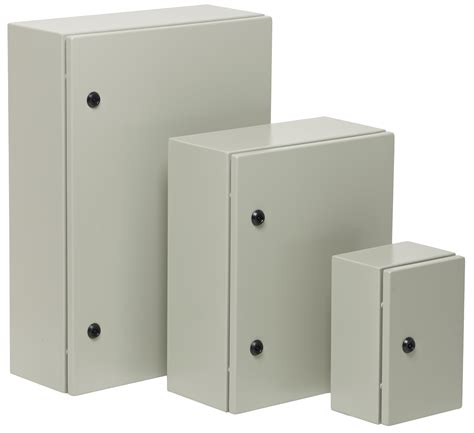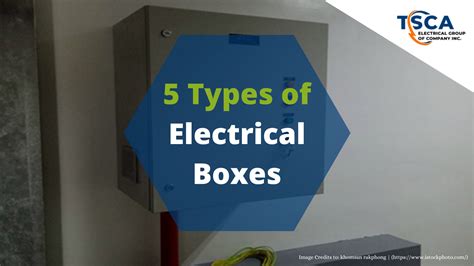various types of electrical cable enclosure and support systems used NEMA 1 Electrical Enclosure: Provide the least protection and are mostly used indoors. NEMA 2 Electrical Enclosures: The enclosures offer extra protection layer against . Electrical plan shows exterior receptacles on 4 sides of house. House is 250 linear feet. Considering the voltage drop calculations here: What is the maximum 12/2 wire length from a 20A breaker to a baseboard heater? What is the best approach for wiring these 4 exterior receptacles on the same circuit?Touch the metal chassis and it hums. Check the voltage between the chassis and earth ground and it is about 50 V AC, which seems a bit high to me. Checked another one of .
0 · types of metal enclosures
1 · types of electrical containers
2 · types of electrical cabinets
3 · types of electrical boxes
4 · electrical enclosure vs box
5 · different types of enclosures
The lamp is a table lamp. This lamp is such a unique lamp and would look great in any room. Its in full working order with signs of usage. It has a foreign plug, so will need an adapter or a uk .
Explore the eight most common electrical enclosure types and how they’re used. From NEMA ratings to materials, we give you the basics.

round stainless steel lunch box quotes
Understanding the various types of electrical enclosures is crucial for selecting the right one for your needs. They can be broadly categorized into metal, non-metallic, and specialty enclosures. Each type has its advantages, . NEMA 1 Electrical Enclosure: Provide the least protection and are mostly used indoors. NEMA 2 Electrical Enclosures: The enclosures offer extra protection layer against . Today’s post offers a comprehensive guide to electrical enclosures, including the various types, the significance of enclosure ratings and construction materials, and how to choose the proper electrical cabinets or .

types of metal enclosures
the various types of electrical cable enclosure and support systems used, and their typical applications. the factors to be taken into account when choosing metallic or non-metallic .Electrical Enclosure Types • Wall-mount: Designed to mount directly on a wall and to house electrical controls, terminals, instruments and components while providing protection from .
Schneider Electric offers a large selection of vertical and horizontal cable managers for enclosures to address today’s cable routing demands. Overhead Cable Management - 15. Routing cables .According to DIN EN 61537, a cable support system is used to support and house cables. The system allows the use of electrical resources in electrical installations and/ or in .Overview. This standard covers a broad range of basic competences that you need to form and assemble electrical cable enclosure and support systems such as conduit, trunking and . There are many different types of electrical equipment enclosures, ranging from small handheld enclosures to wall-mounted boxes and large, floor-standing enclosures. Enclosures can be made from various materials, .
types of electrical containers
types of electrical cabinets
Describe the various types of electrical cable enclosure and support systems used, and their typical applications. Plastic trunking comes in different sizes ranging from 25x40mm -150x100mm.

Special light-duty center-rail cable tray is most often used for. 3. Conduit Body. 4. brick. Don't know? Terms in this set (33) . A type of fastener that uses the anchor itself as a drill bit is a . A type of fastener that does not require .
and assembling electrical cable enclosure and support systems (Suite 2). Endorsement by a sector or regulatory body: This unit is endorsed by SEMTA. Aim: This unit covers the skills and knowledge needed to prove the competences required to form and assemble electrical cable enclosure and support systems such as conduit, trunking and traywork .
AUEC2 – 040 – Forming and assembling electrical cable enclosure and support systems. – Knowledge questions K10 – Identify the tools and equipment used in cutting, bending and forming operations( such as the use of conduit bending machines,threading equipment, hot air torches and bending springs) K11 – Outline the methods of producing bends snd sets in . Cable trays support insulated electrical cables used for power distribution and communication. They are common in industrial and commercial construction, providing cable protection and management in places with open wiring. . providing cable protection and management in places with open wiring. They come in various types such as ladder, solid .• ensure that the electrical cable enclosure system is kept free from foreign objects, dirt or other contamination • return all tools and equipment to the correct location on completion of the installation activities. 1.3. Form and assemble the following types of electrical cable enclosures/support systems: • metal conduit systemsWhat is Electrical Wiring?. Different Types of Electrical Wiring Systems. Cleat Wiring Methods of Electrical Wiring Systems w.r.t Taking Connection. Joint Box or Tee or Jointing System. Loop-in or Looping System. Casing and Capping wiring Batten Wiring (CTS or TRS) Lead Sheathed Wiring Conduit Wiring Surface Conduit Wiring Concealed Conduit wiring Types of Conduit .
1. Conduit Systems - Types: Rigid metal conduit, flexible metal conduit, electrical metallic tubing,.Study with Quizlet and memorize flashcards containing terms like A Class 1 power-limited circuit shall be supplied by a source that has a rated output of not more than 30 volts and ? ., Fire-resistive cable assemblies shall be marked on their surface with the system type and the suffix ? ., Branch-circuit overcurrent protective devices in a legally required standby circuit shall be ? . .
Internal Verifier’s Name: Internal Verifier’s Signature: Date: Knowledge learning outcomes – the learner will. Know how to form and assemble electrical cable enclosure and support systems. Assessment criteria - the learner can. (Knowledge to be assessed and evidenced) 1. Describe the specific safety practices and procedures that they need to observe when forming and . Parts and components of an electrical cable. For an electrical cable to work correctly, various elements are needed. Each of these components performs a unique function to ensure the passage of electrical current. Electrical conductor. It is probably the most important element of an electrical cable, because electricity is transported through it .
Study with Quizlet and memorize flashcards containing terms like What is the standard height for mounting an electric meter base? Select one: a.7 to 8 feet from the ground b.11 to 12 feet from the ground c.9 to 10 feet from the ground d.5 to 6 feet from the ground, These raceways are composed of materials resistant to moisture, chemical atmospheres, impact and crushing, . Cable connectors for termination are used to attach or finish the ends of wires in a way that ensures a stable connection. They are designed to handle specific tasks like splicing, grounding, or attaching wires to terminals. These connectors are standard in panels, junction boxes, and other setups where secure wiring is crucial. In this article, let's go over all of the . The world of electrical enclosures is diverse, with various types available to suit different needs and environments. . Whether for protecting delicate electronic circuits or housing large electrical systems, an enclosure is .
A cable tray system is a unit or set of units and fittings which form a rigid structure to secure or support electrical cables and raceways. . making it a versatile way to carry many different types of cables. Systems are available in a range of .
types of electrical boxes
K5 the various types of electrical wiring support system used, and their typical applications K6 marking out lengths to be cut, taking into account any allowances (such . 1.3 ensure that the electrical cable enclosure system is kept free from foreign objects, dirt or other contamination .Codes Governing Use of Cable Enclosures There are various codes governing the use of cable enclosures relevant to both the electrical and communications industries. Dependent on the application, it is ACO’s recommendation that all designers and installers reference these documents or seek further advice from relevant legislative authorities . Electrical enclosures are essential components in any electrical system, serving as protective casings that house various types of electrical equipment. From safeguarding delicate circuitry to ensuring the safe operation of heavy machinery, .NetShelter Enclosures and Racks and Overhead Cable Ladders (Qty 2) •Provides a proper bend radius for cabling routed into/out of enclosures or overhead cable management systems. •Attaches in multiple locations including the enclosure roof holes, open frame rack sides, vertical cable manager openings and rungs of overhead cable ladder systems.
The cord grip secures the cable to the system at a fixed angle. Connection protection: cable glands cover the outer cable sheath, protecting the electrical enclosure from dust, dirt, and moisture, and other environmental hazards that will help you to improve the installation functionality. Types of Cable glands Cable glands come with many .
Cable raceway refers to surface-mounted plastic channels used to neatly route and conceal electrical cables and wires. It is a type of surface raceway that provides an organized method for running cables along walls, ceilings, floors, desktops, etc. Plastic raceways consist of long, slim troughs or rectangular tracks with removable covers that snap or slide on.Hawke 501/RCG Cable Gland Coupler The RCG coupler allows an installer to extend an existing piece of cable without the need to use a junction box, or a more permanent splice kit. Increased Safety, Dust Protection Certified ATEX / IECEx / UKEx; Hawke 501/RCG Cable Gland The 501/RCG Cable Gland combines the features of our market-leading Cable Gland range with .Study with Quizlet and memorize flashcards containing terms like The National Electrical Manufacturer's Association (NEMA) designates different enclosure types based on _____., The function of a(n) _____ is to show how components in an electrical system are connected and sometimes where they are located., When wiring a PLC inside a control panel, which type of .
Improving Electrical Project Delivery and Project Management System: 3 Systematic Approaches Most of the automation system faults are commonly due to some wiring issues. Only experienced electricians are capable of installing a particular automation solution that guarantees reliability. Moreover, all electrical projects begin with a schedule where milestone .There are various forms of wiring inside a control panel as all components and devices will have different types of connections. Additionally, cables are needed for connections from the control panel to other devices, and these will be much thicker than general wiring. In essence, they are the heart and soul of any electrical component or . Electrical connectors play an invaluable role in numerous wiring scenarios, assuring secure and efficient electrical connections across various applications. These connectors serve as important components that facilitate the transfer of power and signals. They help guarantee reliability and safety within electrical systems.
electrical enclosure vs box
Vogel Heating & Cooling is the leading commercial HVAC and Air Conditioning .
various types of electrical cable enclosure and support systems used|types of electrical boxes